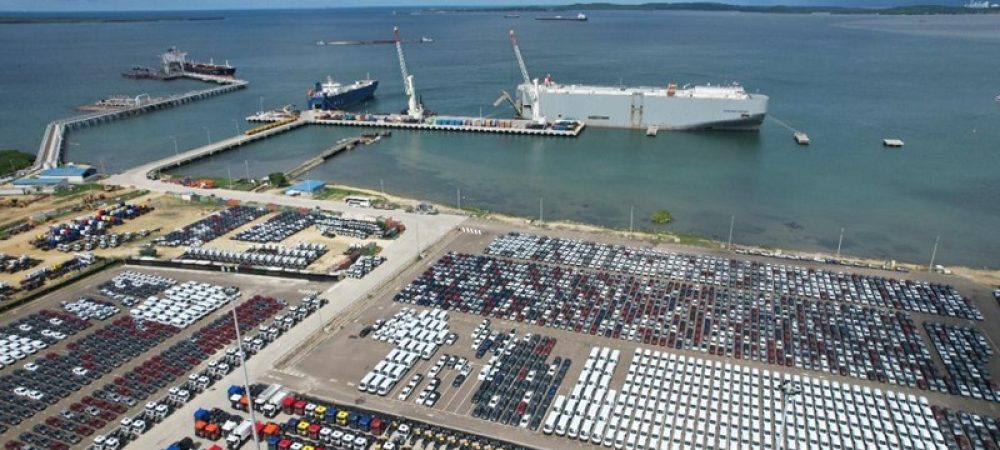Puerto Bahía, Claro and Nokia are pioneers in digitizing the maritime industry with private industrial networks. Consequently, Puerto Bahía will support its Digital Transformation to become a 4.0 port and the first multipurpose port in Latin America and Colombia to implement such solutions.
The Bay of Cartagena continues its development and expansion with the most advanced systems for managing all types of cargo. Among its notable figures are over 50 docks and maritime terminals, 17 reserved for foreign trade.
It is also important to highlight that 60% of the trade between Colombia and the United States occurs through the Bay of Cartagena.
At every port, the terminals along the Bay focus on diverse cargo, including fish, infrastructure, the petrochemical industry and its related products. Additionally, there is a tourist port where an increasing number of cruise ships dock every day.
According to the port society of the Bay of Cartagena, nearly 40 million tons of cargo are traded annually, transported by over 3,000 vessels, operating seven days a week and 24 hours a day, all year round.
The Bay of Cartagena seeks to have the most advanced technology to make operations attractive for importers and exporters.
A mobile and wireless network for the present
An example is the announcement made by the Port Society Puerto Bahía de Cartagena, which stated that, together with Claro Colombia and Nokia, it would implement the private 4G LTE network, the first of its kind developed in a multipurpose port in Latin America; this will enable its 4.0 Digital Transformation with the highest standards of technological services.
The Port Society Puerto Bahía is Colombia’s most modern multimodal maritime terminal and has the privilege of its strategic location in the heart of the Bay of Cartagena. The port boasts the highest technology and quality controls, as it was conceived to boost exports in Colombia and increase the competitiveness of the country and the region.
Puerto Bahía is a public terminal that facilitates the trans-shipment of goods and presents itself as the best export option for small, medium and large national producers. It is also an efficient and valuable gateway for imports entering Colombian territory.
The multipurpose terminal located in Barú, Cartagena (Colombia), adheres to high standards of security and productivity. It consists of two terminals: one for general cargo and another for hydrocarbons, with the latter being Colombia’s most extensive private hydrocarbon terminal.
Both terminals are highly adaptable to the cargo needs of medium and large companies in the country that have specialized cargo requirements, such as handling items with weight heavier than the average (oversized) or dimensions larger than conventional ones, as well as roll-on/roll-off cargo. The liquid terminal is capable of handling bulk and direct cargo.
The first private 4G LTE network of its kind
With its private 4G LTE network, the Port Society Puerto Bahía will support a wide range of mission-critical communication use cases to provide coverage and meet the persistent demands of the terminal, increasing its productivity. Similarly, it will enable complete visibility of activity and the operating system to control manual and remote operations.
The solution, developed by Claro Colombia and Nokia, will include deploying and operating a low-latency, ultra-reliable and secure industrial-grade 4G LTE private wireless network that will utilize the Nokia Digital Automation Cloud solution.
It can connect hundreds of workers, sensors, equipment, vehicles, cranes and operators, providing new levels of automation, security and control within the Puerto Bahía facilities.
“Innovation is in the organization’s DNA. Our goal as a company is to implement technological tools that help us position ourselves as a Smart Port 4.0. Without a doubt, we are creating a great scenario for the optimization of port logistics and the development of various use cases that will lead us to more effective operations with the implementation of the private network based on 4G technology, which will be beneficial for our clients, suppliers and collaborators,” said Rodrigo Torras, CEO of Puerto Bahía.
A solution with high projection
Carlos Zenteno, President of Claro Colombia, added that: “At Claro, we work every day to make a better country possible, and this joint development is proof that by investing in the implementation of first-class infrastructure, we will strengthen technological advancement, security and efficiency of the port, thereby promoting the Digital Transformation of Cartagena, one of the country’s main seaports. With this reliable, high-performance, and low-latency private network, they will have better tools and connectivity to support the goal of becoming a 4.0 port.”
Paolo Veglio, President of Nokia Colombia, stated: “We are proud of this collaboration with Claro and Puerto Bahía, becoming pioneers in digitizing multipurpose port terminals with private wireless networks in Latin America. The maritime sector will benefit from implementing the most advanced Industry 4.0 capabilities, reaffirming our commitment to developing the best digitization and industrial-grade connectivity standards.”
Click below to share this article

